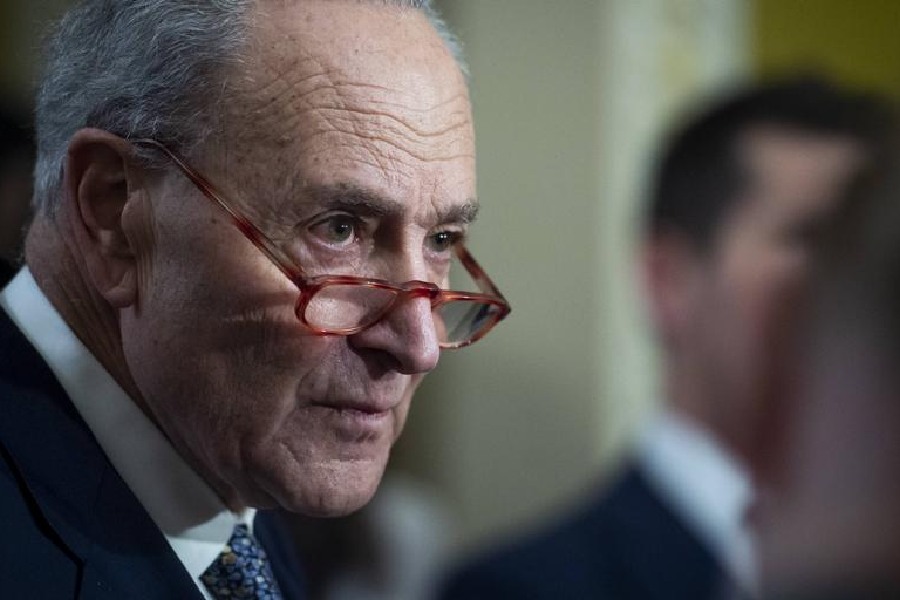Democratic Senate majority leader Chuck Schumer gave a 40 minute speech on the Senate floor, during which he strongly criticized Prime Minister Benjamin Netanyahu and Israel's governing coalition for "tolerating the civilian toll in Gaza, which is pushing support for Israel worldwide to historic lows."
Meanwhile, an aid vessel carrying 200 tons of much-needed food aid is due to arrive in Gaza on Thursday.
In Washington, the Biden administration imposed sanctions on three Israeli settlers and two Israeli settler outposts in the occupied West Bank.
Meanwhile in the Red Sea, a new Houthi attack on the Gulf of Aden did not affect any vessels, according to the US Central Command.
Here's a roundup of the latest in the Israel-Hamas war and its impact on the region for Thursday, March 14:
Palestinian President Mahmoud Abbas has appointed his longtime economic adviser, Mohammad Mustafa, to be the next prime minister of the Palestinian Authority, the official Palestinian news agency WAFA reported on Thursday.
Mustafa is an independent executive committee member of the Palestine Liberation Organization. He has previously served as deputy prime minister for economic affairs and held a board seat on the Palestine Investment Fund.
He has worked in a number of senior positions at the World Bank and has also advised the Kuwaiti government and the Saudi Arabian sovereign wealth fund.
The appointment comes more than two weeks after the previous prime minister of the Palestinian Authority, Mohammad Shtayyeh, resigned along with his government citing the "new reality in the Gaza Strip."
Since 2007, control of the Palestinian territories has been divided. The occupied West Bank has been controlled by the Palestinian Authority of Abbas, while Gaza has been controlled by Hamas, which is considered a terror organization by the US, the EU, Germany and other governments.
US Senate Majority Leader Chuck Schumer has said he believes Israeli Prime Minister Benjamin Netanyahu has "lost his way" and is among "major obstacles to peace" in Gaza, the West Bank and Israel.
Schumer, the Senate's first Jewish majority leader and the highest-ranking Jewish official in the US, delivered a withering criticism of Netanyahu in a 40-minute speech on Thursday morning.
While Schumer maintained that he "loved Israel in his bones" and said the country was surrounded by "vicious enemies" the Democrat politician added that the Israeli premier had entered a coalition with far-right extremists and "as a result, he has been too willing to tolerate the civilian toll in Gaza, which is pushing support for Israel worldwide to historic lows."
"I will never underestimate the grave threats Israel faces," Schumer said. "What Hamas did was brutal beyond imagination," he added.
However, Schumer continued saying that "we should not let the complexities of this conflict stop us from stating the plain truth: Palestinian citizens do not deserve to suffer for the sins of Hamas, and Israel has a moral obligation to do better. The United States has an obligation to do better."
Schumer said Washington should provide robust humanitarian aid to Gaza and pressure the Israeli government to allow more of it to enter the coastal territory.
To achieve a two-state solution, Schumer said, "things must change."
Schumer said there were "four major obstacles" to peace, listing them as Hamas and its supporters, radical right-wing Israelis in government and society, Palestinian Authority President Mahmoud Abbas and Netanyahu himself.
"Until they are removed from the equation, there will never be peace in Israel and Gaza, and the West Bank," Schumer added.
Later Thursday, the US State Department said that Schumer's comments were not those of the administration of President Joe Biden, emphasizing that the US Congress is an independent branch of government.
However, State Department spokesperson Matthew Miller added that "there are a number of things we wanted to see Israel do differently."
EU humanitarian chief Janez Lenarcic has urged Israel to increase land access to the Gaza Strip for aid deliveries.
He said airdrops and a maritime corridor will not be enough to supply the Palestinian enclave with assistance.
"There is a risk of famine," Lenarcic said. "We already have a very strong and credible indication that there are pockets of famine already in the Gaza Strip."
"What is needed is very clear: a surge in humanitarian aid into Gaza and its distribution throughout Gaza," he said. "There is no meaningful substitute for land access... we call on Israel to open additional land crossings."
The United Nations has estimated that over half a million people in the territory are on the brink of starvation.
The US Treasury Department on Thursday imposed sanctions on three Israeli settlers and two Israeli settler outposts in the occupied West Bank.
The outposts are believed to have been used by "extremist" Israeli settlers as a base for attacks against Palestinian civilians, US news website Axios reported earlier Thursday.
The sanctions would freeze any assets the three settlers and two outposts might have in the United States. They would also ban them from obtaining a US visa and block them from using the US financial system.
German Chancellor Olaf Scholz is scheduled to visit Israel on Sunday, Israeli media reported.
The visit would be Scholz's second since the conflict erupted in October. He will also stop in Jordan, sources told the German DPA news agency.
Scholz and the German government have consistently defended Israel's right to defend itself against the Palestinian militant group Hamas, which carried out the October 7 terror attacks that resulted in the deaths of nearly 1,200 people in southern Israel and saw about 240 more taken hostage.
The group is listed as a terrorist organization by several countries, including Germany, the United States and Israel.
Berlin has also supported a cease-fire that could see the release of the hostages still held by Hamas. A temporary cease-fire in November saw the release of about 100 hostages.
Scholz has rejected a planned Israeli military operation in the area of Rafah in southern Gaza, where over a million Palestinians are gathered after fleeing fighting elsewhere in the enclave.
The German government has announced it will contribute to a planned aid corridor for Gaza by sea as the humanitarian situation further worsens in the strip. The German Air Force also announced it will join the countries airdropping urgently needed aid into Gaza.
The number of Palestinians killed in the Gaza Strip since October 7climbed to 31,341, Gaza's Hamas-run Health Ministry said on Thursday.
The ministry also counted 73,134 injuries since October.
In the past 24 hours, the ministry said 69 Palestinians were killed and 110 more were injured in the enclave.
Gaza health officials do not differentiate between combatants and civilians but said two-thirds of the dead were women and children. The ministry's casualty counts have not been independently verified, but the United Nations and multiple humanitarian organizations consider the numbers broadly reliable.
Health Ministry officials in the Hamas-run Gaza Strip told Reuters news agency that Israeli forces opened fire late on Wednesday on Palestinians rushing to get aid supplies in Gaza City, killing six.
Palestinians were crowding at the Kuwait roundabout in Gaza City when the incident occurred, Reuters reported, citing residents and officials at the Hamas-led Health Ministry.
Some 83 more people were wounded, Qatari broadcaster Al Jazeera reported.
The Kuwait Roundabout in Gaza City is where people usually gather to wait for aid trucks.
Al Jazeera cited its journalist in Rafah, Hani Mahmoud, as saying that seeking aid in Gaza has become “really dangerous” in the enclave, adding that “the Kuwaiti Roundabout is now known as a death trap.”
On February 29, Palestinian health authorities accused Israeli forces of shooting and killing over 100 Palestinians waiting for aid near Gaza City. Israel blamed the deaths on the crowds surrounding aid trucks, suggesting the victims had been trampled or run over.
A vessel carrying 200 tons of badly needed food aid is slowly sailing toward the Gaza Strip, devastated by over five months of war that has left many of the population of 2.3 million on the brink of famine, according to the UN.
The Spanish Open Arms aid vessel left from Cyprus on Tuesday, in cooperation with the World Central Kitchen aid group. The current voyage is the first of several planned as part of a maritime aid corridor to the Gaza Strip.
Specialist website Marine Traffic showed the vessel moving slowly south off the coast of Israel on Thursday.
On Wednesday, Cypriot Foreign Minister Constantinos Kombos said a second aid ship "with bigger capacity" was being prepared.
Kombos led a virtual meeting on the maritime corridor with US Secretary of State Antony Blinken and senior ministers and officials from the UK, the United Arab Emirates, Qatar, the European Union and the United Nations.
"The ministers agreed that there is no meaningful substitute to land routes via Egypt and Jordan and entry points from Israel into Gaza for aid delivery at scale," the meeting parties said in a joint statement.
They also called on Israel to open the port of Ashdod, which lies north of Gaza, for aid deliveries.
Since the beginning of the war on October 7, 303,930 tons of aid have been delivered to Gaza, according to COGAT, the Israeli military body that handles Palestinian civilian affairs.
The United States is preparing to impose new sanctions on two illegal settler outposts in the occupied West Bank, and the sanctions are expected to come in as soon as Thursday, US news site Axios reported, citing three US officials.
The outposts are believed to have been used by "extremist" Israeli settlers as a base for attacks against Palestinian civilians, Axios said.
Such measures would represent the first time the US imposes sanctions against entire outposts rather than individuals.
The Biden administration will also impose new sanctions on three Israeli settlers, one US official told Axios.
The sanctions would freeze any assets the three settlers and two outposts might have in the United States. They would also ban them from obtaining a US visa and block them from using the US financial system.
Last month, the US imposed sanctions on four Israeli men it accused of involvement in settler violence in the West Bank.
An anti-ship ballistic missile attack by Yemen's Houthi rebels on the Gulf of Aden has caused no damage or injuries, the US Central Command said on Thursday.
In its daily Red Sea report, CENTCOM said the missile was fired from Houthi-controlled areas of Yemen.
"The missile did not impact any vessels and there were no injuries or damage reported," the CENTCOM said.
CENTCOM added that it "successfully engaged" with the Houthi attacks, destroying four unmanned aerial systems (UAVs) and one surface-to-air missile.
"It was determined these weapons presented an imminent threat to merchant vessels and US Navy ships in the region," CENTCOM said.
It added that such actions were taken to "protect freedom of navigation and make international waters safer and more secure for US Navy and merchant vessels."











